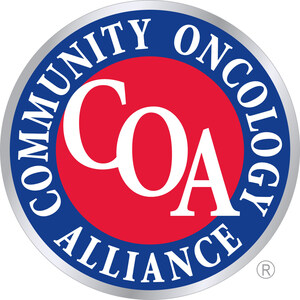Community Oncology Continues Precipitous Consolidation of Cancer Care
Negative Impact to Patients Increasing for Third Consecutive Year
WASHINGTON, April 4, 2012 /PRNewswire/ -- The Community Oncology Alliance (COA), a non-profit organization dedicated to preserving and fostering community cancer care, today released a new report (http://tiny.cc/9gw8bw) documenting cancer clinic closings and the stresses to the cancer delivery system. This latest report comes on the heels of studies released by Avalere and Milliman documenting lower costs to patients and payers of cancer treatment provided in community clinics and widespread media reporting of the cancer drug shortage gripping the nation.
The COA report reveals the continuance of a dire negative trending: 241 community cancer clinic sites have closed during the past four and a half years, and 442 practices (often with multiple clinic locations) are struggling financially. Consolidation of cancer care is documented by 392 practices that have been purchased by hospitals, or formed a financial arrangement, and 132 practices that have merged or been acquired by a corporate entity.
"As a practicing oncologist, I am critically concerned about the adverse impact on patients of the dramatic changes in our delivery of cancer care," said David Eagle, MD, president of COA and an oncologist in Lake Norman, NC. "Patients are falling through the treatment cracks and now we are struggling to find essential cancer care drugs. Forty years ago we declared the war on cancer, and I never thought I would see the day when we would be at risk of losing the war."
In 2005, the Centers for Medicare & Medicaid Services (CMS) implemented significant Congress-mandated changes to the way Medicare, which accounts for close to half of all cancer treatment costs, reimburses for cancer care. Unlike other areas of medicine, Medicare has an inordinate influence on how private payers reimburse for cancer care. This initiated a change in the cancer treatment landscape, as documented by the latest COA report just released. Recent studies by Avalere (http://tiny.cc/ejw8bw) and Milliman (http://tiny.cc/lkw8bw) have documented the lower costs to patients, Medicare, and private payers when care is delivered in oncologists' community practices.
"Our practice has had to close a clinic in Wyoming because of unworkable changes to payment for cancer care," said Patrick Cobb, M.D., an oncologist in Billings, MT, and immediate past president of COA. "The overall crisis in cancer care is hurting patients and increasing costs for them and every American taxpayer. Congress has to act swiftly or we will end up with less access to quality cancer care and higher costs — the exact opposite of healthcare reform."
"An imploding cancer delivery landscape and drug shortages, combined with the debacle of SGR-based physician Medicare payment cuts, are a recipe for disaster," said Ted Okon, Executive Director of COA. "We have solutions but the Administration and Congress are more interested in political infighting and short-term patching than stabilizing and strengthening the cancer care delivery system, now and for generations of Americans to come."
By 2020, there will be an estimated shortage of 4,080 oncologists, the equivalent of one in four cancer patients without an oncologist. National Analysts released a study reporting that 20% of oncologists would discourage a medical student/resident from pursuing a career in oncology, versus only 3% in 2003, prior to the problems caused by severe Medicare payment cuts.
About Community Oncology Alliance (COA)
Formed in 2003 by community oncologists, COA is a non-profit organization dedicated solely to community oncology, where four out of five Americans with cancer are treated. COA advocates for patients' access to quality, affordable cancer care in the community setting. The organization is currently advocating for a solution to the nation's drug shortage crisis. COA Past President Dr. Patrick Cobb and COA Executive Director Ted Okon have both been asked to testify before Congress on the reasons for the shortages and their impact on cancer treatment. COA also has a multi-stakeholder group involved with the implementation of the Oncology Medical Home, a cancer care model that fosters quality and value in cancer care.
SOURCE Community Oncology Alliance
WANT YOUR COMPANY'S NEWS FEATURED ON PRNEWSWIRE.COM?
Newsrooms &
Influencers
Digital Media
Outlets
Journalists
Opted In





Share this article